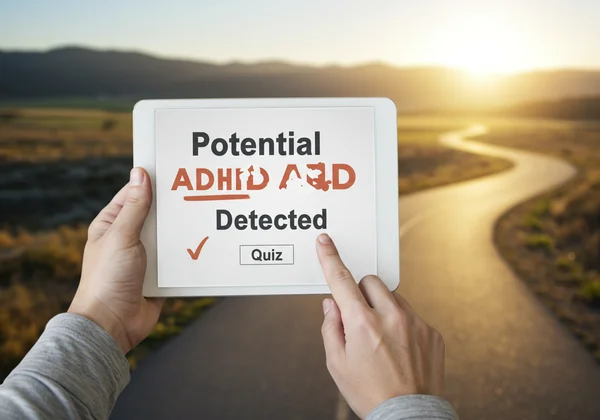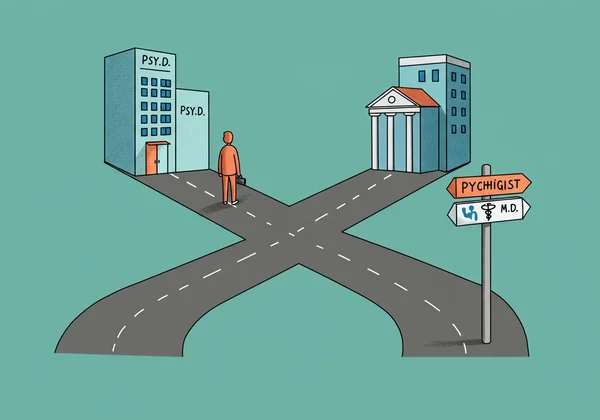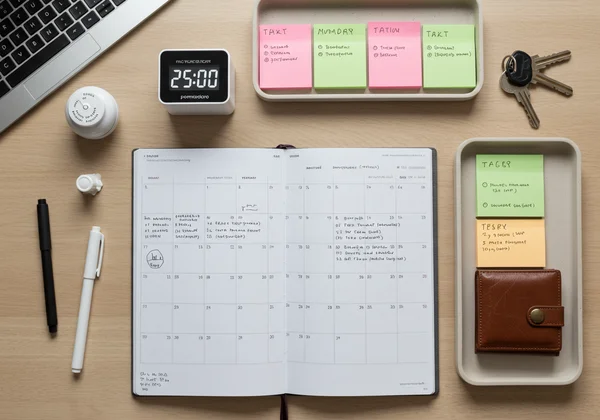After Your ADHD Quiz: A Guide to Your Next Steps
August 17, 2025 | By Julian Navarro
You’ve just taken an online ADHD quiz and have your results in hand. That final screen can bring a wave of emotions—relief, confusion, validation, or even a bit of anxiety. Whatever you’re feeling right now is completely normal. Taking that first step toward understanding yourself or your child is significant. The big question now is what to do after an adhd quiz? This guide is here to walk you through your results and provide clear, actionable adhd next steps on your journey toward clarity.
This is a pivotal moment. You're moving from a place of questioning to a path of understanding. While an online tool is an excellent starting point, knowing how to interpret and act on the information is crucial. Whether you're an adult who has long suspected something was different or a parent concerned about your child's development, this guide will help you navigate what comes next. If you haven't taken our assessment yet, you can gain clarity now with our free, confidential quiz.

Step 1: Understanding Your ADHD Quiz Results
Before you jump to any conclusions, it's essential to put your results into the proper context. The score or summary you received isn't a label; it's a piece of information. Think of it as a signpost on a map, pointing you in a potential direction, not the destination itself.
It’s a Screener, Not a Diagnosis
The most important thing to understand is that an online ADHD quiz is a screening tool. Its purpose is to help identify whether you or your child exhibit traits commonly associated with Attention-Deficit/Hyperactivity Disorder based on established criteria like the DSM-5. It is a preliminary step, designed to be informative and educational.
A formal diagnosis can only be made by a qualified healthcare professional after a comprehensive evaluation. Our free ADHD quiz is designed to be a reliable and scientifically-backed first step, but it does not replace the nuanced, in-depth assessment performed by a clinician. It’s the difference between a weather app warning of a potential storm and a meteorologist analyzing the data to give a definitive forecast.
What "Potential ADHD Traits" Really Means
When your results indicate "potential ADHD traits," it means your responses align with patterns of inattention, hyperactivity, or impulsivity seen in individuals with ADHD. This is valuable information. For many, it’s the first time their lifelong struggles have been given a name, which can feel incredibly validating.
However, these traits can also overlap with other conditions, such as anxiety, depression, or even stress-related burnout. The results don't tell you why you have these traits, only that they are present. This is why using the results as a catalyst for further exploration, rather than a final answer, is the most responsible approach.
Using Your Results as a Starting Point for Conversation
The true power of your quiz results lies in their ability to start a meaningful conversation. You now have structured information to discuss with a doctor, a therapist, or even a loved one. Instead of saying, "I think I might have ADHD," you can say, "I took an ADHD self-assessment quiz that indicated potential traits of inattention, and I’d like to explore this further."
For parents, this provides a concrete starting point for discussions with a pediatrician or school counselor. It moves the conversation from general concerns about behavior to specific, observed patterns that warrant a closer look.
Step 2: Deciding on Seeking an ADHD Diagnosis
With your quiz results in hand, you’re at a crossroads. The next logical step for many is considering a professional evaluation. This decision is personal and depends on how significantly these potential traits are impacting your daily life, work, or relationships.
When is a Professional Evaluation Recommended?
Consider seeking a formal evaluation if the symptoms highlighted in your quiz results are persistent and negatively affecting key areas of your life. Ask yourself:
- Are these challenges causing significant stress or frustration at work or school?
- Do they interfere with my ability to maintain relationships?
- Do I struggle with managing daily responsibilities like paying bills, keeping appointments, or household chores?
- For parents: Is my child struggling academically, socially, or behaviorally in a way that seems beyond typical childhood challenges?
If the answer is "yes" to one or more of these questions, seeking a professional opinion is a highly recommended next step.

Finding the Right Healthcare Professional (Psychiatrist vs. Psychologist)
Navigating the healthcare system can be confusing. For an ADHD diagnosis, you generally have two main paths: a psychologist or a psychiatrist.
- Psychologists (Ph.D. or Psy.D.) are trained in psychological testing and therapy. They can conduct comprehensive evaluations and provide therapy (like CBT) to manage symptoms. They cannot prescribe medication.
- Psychiatrists (M.D. or D.O.) are medical doctors who specialize in mental health. They can diagnose ADHD, rule out other medical causes for your symptoms, and prescribe medication if it's deemed necessary.
Your primary care physician is often a great first stop. They can provide a referral and help you find the right specialist for your needs.
For Parents: Discussing Results with Your Child’s School or Pediatrician
For concerned parents, the results from a childhood adhd quiz are a powerful tool for advocacy. Schedule an appointment with your child's pediatrician and bring a summary of your observations and the quiz results. This structured information helps them understand your concerns clearly.
You can also request a meeting with your child's teacher or school counselor. Share your concerns and ask about their observations in the classroom setting. This collaboration between home and school is vital for creating a supportive environment for your child, whether or not a formal diagnosis is ultimately made.
Step 3: How to Get Diagnosed with ADHD Officially
Once you've decided to move forward, understanding the official diagnostic process can help ease any anxiety about the unknown. It’s a thorough process designed to ensure an accurate and helpful outcome. Knowing how to get an official ADHD diagnosis is a crucial part of the journey.
Preparing for Your First Appointment
To make your first appointment as productive as possible, a little preparation goes a long way. Gather any relevant documents or notes, including:
-
Your results from the online adhd quiz.
-
A list of specific symptoms or challenges you've noticed.
-
Examples of how these challenges impact your life at work, home, or in social settings.
-
Any school report cards or performance reviews (past and present) that might show long-term patterns.
-
A list of any current medications and a brief family health history.

What to Expect During a Clinical Evaluation
A clinical evaluation for ADHD is more than just a checklist. A qualified professional will conduct a comprehensive assessment that may include:
- Detailed Interviews: Discussing your personal, medical, and developmental history.
- Symptom Checklists & Rating Scales: Formal questionnaires for you and sometimes for a family member or partner.
- Review of Records: Looking at past school or work performance records.
- Comprehensive Assessment: A series of psychological tests to assess cognitive functions like attention, memory, and executive functioning.
This process is designed to build a complete picture of you as an individual, not just your symptoms.
Ruling Out Other Conditions like Anxiety or Depression
A key part of the diagnostic process is ruling out other conditions that can mimic ADHD symptoms. Difficulty concentrating, restlessness, and disorganization can also be signs of anxiety, depression, thyroid issues, or sleep disorders. A thorough evaluation will differentiate between these conditions to ensure you receive the correct diagnosis and treatment plan. This is why a simple online quiz can't be a final answer—it takes a professional to untangle these complex threads.
Step 4: Initial Coping Strategies While You Wait
The wait for a specialist appointment can sometimes be long. However, you don't have to put your life on hold. There are many practical strategies you can implement right now to start managing your challenges and building momentum.
Simple Organizational and Time Management Tips
-
Use a Planner: Whether digital or physical, write everything down. Appointments, deadlines, and to-do lists.
-
Break Down Tasks: A large project can feel overwhelming. Break it into small, manageable steps to reduce procrastination.
-
Set Timers: Use the "Pomodoro Technique" (25 minutes of focused work followed by a 5-minute break) to improve focus and fight burnout.
-
Create a "Home" for Everything: Designate specific spots for your keys, wallet, and phone to reduce time spent searching for them.

Communication Strategies for Home and Work
- Be Direct and Clear: When communicating your needs, be specific. Instead of "I'm overwhelmed," try "I need 30 minutes of uninterrupted time to finish this report."
- Practice Active Listening: In conversations, repeat back what you heard to ensure you understood correctly. This can prevent misunderstandings caused by inattention.
- Use Written Follow-Ups: After an important meeting or conversation, send a brief email summarizing the key points and action items.
Finding Reputable Support Communities
Connecting with others who have similar experiences can be incredibly empowering. Look for online forums, local support groups, or social media communities dedicated to adults with ADHD or parents of children with ADHD. Sharing stories and strategies can reduce feelings of isolation and provide practical advice from people who truly get it.
Taking the Next Confident Step
Taking an ADHD quiz was a courageous first step. You've moved from wondering to knowing—and now you have a roadmap for what comes next. Your path forward is clear: use your results as a starting point, decide if a professional evaluation feels right, and start using practical strategies today. Each step you take brings you closer to the clarity you deserve. Your journey is unique, and taking control of it is a powerful act. We encourage you to use this information to take your next confident step. If you'd like to review your results or share the tool with someone else, you can always take the first step on our homepage.
Frequently Asked Questions About Next Steps
How do I know if I really have ADHD after a quiz?
An online quiz can strongly suggest the presence of ADHD traits, but it cannot provide a definitive diagnosis. The best way to know for sure is to undergo a comprehensive evaluation with a qualified healthcare professional, like a psychologist or psychiatrist. Use your results from our ADHD quiz as a starting point for that professional conversation.
Is it possible my symptoms are from anxiety and not ADHD?
Yes, it is very possible. There is a significant overlap in the symptoms of ADHD and anxiety, including restlessness, difficulty concentrating, and feeling overwhelmed. A thorough clinical evaluation is essential to differentiate between the two conditions or determine if they are co-occurring, which is also common.
What kind of doctor can give an official ADHD diagnosis?
An official ADHD diagnosis can be made by a medical doctor (like a psychiatrist or a neurologist), a licensed psychologist, or another qualified mental health professional with expertise in neurodevelopmental disorders. Your primary care physician is an excellent resource for getting a referral to the right specialist.
Disclaimer: This article is for informational purposes only and does not constitute medical advice. The information provided by our online quiz and this blog is intended as a preliminary screening tool and educational resource. It is not a substitute for professional diagnosis, treatment, or consultation with a qualified healthcare provider.